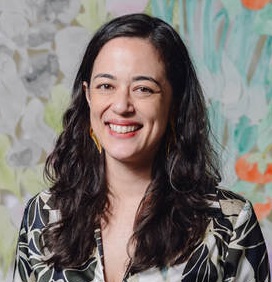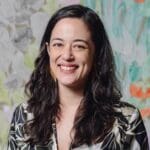Transforming Intergenerational Pain into Inspiration and Strength
May 18, 2023 - 9:52 am
 Lauren Iida
Lauren Iida
-YK
91.3 KBCS Music and Ideas. I’m Yuko Kodama
Lauren Iida is a local artist whose work Adorns public spaces including the Washington State convention center, Plymouth housing in Seattle and Uncle Bob’s place in Seattle’s Chinatown international district a cross from the wing luke museum. Her artwork is often themed around the Japanese American experience.
You see, Lauren Iida’s paternal grandparents and great grandparents were forcibly removed and incarcerated along- side about 120,000 Japanese Americans by the US government during WWII. The event scarred the family. Lauren Iida’s artwork, usually made of hand cut paper is often inspired by photos, documents and oral histories found through Densho,, a repository to document this historical time for Japanese Americans.
Iida describes the approach to her artwork.
-LI
I create what I call paper cutaways, and they’re cut paper compositions that I make with a scalpel, like an Exacto knife.
I am biracial, my father is Japanese American – and the Japanese part of my heritage has always been kind of a mystery to me. Growing up as a child, I didn’t really have very much access to Japanese things – I think mostly because my grandmother was incarcerated during World War II at Tule lake. And after that, she tried to shed the stigma of the racism by raising her children in a very “American way”, so the only thing that made it down to me really was some Japanese foods. But I always looked at those things in a magical way. …Like, I wondered at those things….and I did want to know more when I was a kid, but there wasn’t really much information available to me. So as an adult, I’ve really focused on learning more and researching more on the topics of my Japanese heritage and being a Japanese American.
At first, I didn’t really know anything about any kind of history related to the incarceration of Japanese people, during World War II. I knew that it had happened, but it was such a small part of any conversation I ever had with my paternal grandmother, or with my father or really with anybody in my family. – So as I grew up, I sort of started to hear about it. I remember very briefly studying it at public school, but I had a lot of questions. – So as I grew up and discovered the Densho archives, I was really, really interested and fascinated by it. Just looking through all the photographs and documents and listening to oral histories.
And then I started to make art about it. But basically, as I got older, and I kept studying those things and researching those histories, I realized that it was natural to not really want to talk about those things for my grandmother especially. – And I understand why she wanted to put on an air of being very pro-America and very not-Japanese honestly. Because after being persecuted for her race, I can really understand why she raised her children that way, and why she acted that way. – But I think it’s a real shame. And it’s an injustice to me that I don’t get to know about my family heritage, my cultural heritage, because she was traumatized by the US government’s racist protocols. – And for a whole variety of reasons, many people are disconnected from their cultural heritage – displacement, if they’re refugees, if their parents were traumatized, if there was just a break in the lineage for any reason or break in the communication… I think it’s a really common situation that I’m in.
Regarding storytelling and passing down of information from our elders to us, it’s really complicated. – Because sometimes they don’t want to talk about things because of trauma. Because they don’t want to relive sad events for themselves. And sometimes they don’t want to burden us with negative or sad memories. And other times, I find that they just don’t think that it’s interesting. They’re surprised to learn that young people would think that their experience was interesting. My grandma Clara, who’s 102, She asked me the other day, “Why do you know so much about me? And why do you care?” And I said, because your life has been so fascinating and so interesting…and it’s been a source of inspiration for me and my artwork for many years…and it always will be. I study your life, and I’ve done a lot of research and I remember all the answers to all the questions that you give me. –And she laughed, like she was tickled by that.
I think it’s a really essential function of being a human being – finding out where we came from, and also trying to get the information that feels like it’s helping you put together the puzzle of who you are and who you want to be. When I learn more about the struggles that my ancestors and their peers went through, being incarcerated during World War II, it does give me more personal strength. I’m inspired by their stories, and I’m inspired by their optimism and their attitude and their strength and resilience, going through that really difficult time. (And) it does help me keep my own life struggles in perspective. (And) I think that is something that we often fail to do in our lives, especially in a privileged country like the United States.
There are people who are suffering around us here also in the US right now. And when we give something of ourselves to somebody else, and when we listen to somebody else’s story, we share an experience with them and we feel compassion for them. (and) We also learn something about ourselves. So, I really encourage people to, to share their stories and also listen to other people’s stories because everybody has a story, and the more we share our stories, the more we understand about each other, and hopefully the more we can get along.
-YK
That was local artist, Lauren Iida. She’s represented by ArtXchange. Iida will be unveiling a 30-foot paper memory net featuring symbolic objects from the book, Swimmers by Julie Otsuka. Tomorrow at 7 pm at the Seattle Public Library Central branch in downtown Seattle. For more information about the event and to support our work, you can visit kbcs.fm


